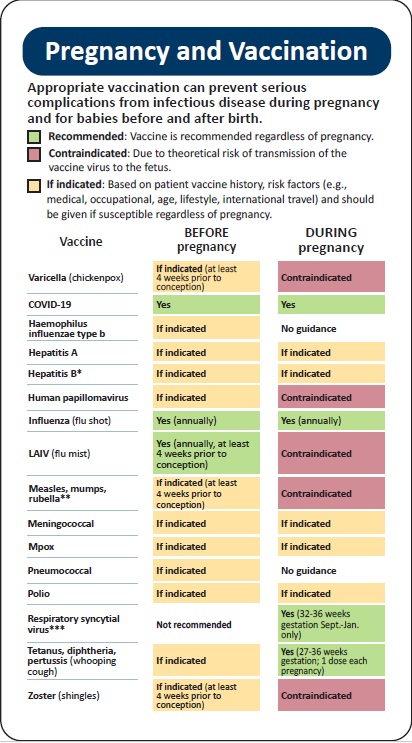Contact Info
Pregnancy and Vaccination
Provider recommendations for maternal vaccination have been shown to be highly effective at increasing vaccination rates. Appropriate vaccination before, during and after pregnancy can prevent serious complications from infectious disease for pregnant persons, the fetus, and newborns.
 | Pregnancy and Vaccination Pocket Guide (PDF) A guide for health care providers that outlines vaccination decisions prior to pregnancy, during pregnancy, after pregnancy and in the baby's first year. Updated 02/2025 Printed guides are available for order at Order Printed Immunization Materials. |
- CDC: Pregnancy and Vaccination
CDC has a variety of resources for health care providers who care for patients before, during and after pregnancy. - CDC: Adult Immunization Schedule by Medical Condition and Other Indication
An immunization schedule to assist health care providers in determining recommended vaccines for specific medical or other indications, including pregnancy.
Vaccination during pregnancy
Tdap
- Should be administered between 27- and 36-weeks’ gestation during each pregnancy, preferably earlier in that timeframe.
- Can be given regardless of the interval since last Td or Tdap.
- Give Tdap instead of Td for wound management during pregnancy.
- Only Tdap provides protection from pertussis. Td does not provide pertussis protection.
During a community outbreak of pertussis, Tdap can be given at any time during the pregnancy. Pregnant people who have not received a primary Td/Tdap/DTaP series should receive three doses. While either Td or Tdap can be used for the series at intervals of 0, 1 and 6 months, at least one of the 3 doses should be Tdap, preferably given between 27-36 weeks.
COVID-19
COVID-19 vaccine may be administered in any trimester. It can be given as soon as possible during pregnancy to maximize maternal and fetal health. Pregnant people are more likely to require hospitalization, intensive care, and ventilator support if they become infected with COVID-19 during pregnancy. There is also an increased risk of complications including, preterm birth and stillbirth.
Influenza
- People who are or will be pregnant during the influenza season should receive an inactivated or recombinant influenza vaccine as soon as it is available.
- Flu mist (LAIV3) is contraindicated during pregnancy.
- Influenza is more likely to cause illness that results in hospitalization in pregnant people. Maternal antibodies that provide protection from influenza can be passed to the infant during pregnancy and through breastmilk.
Respiratory syncytial virus (RSV)
RSV is one of the most common causes of infant hospitalization and death. There are two immunization options to protect infants from RSV. Either immunization choice (pregnant person or infant) is highly effective at providing protection.
- Pregnant people: The RSV vaccine is recommended to be given to pregnant people between 32 through 36 weeks' gestation. It is administered seasonally between Sept.-Jan.
- Infant immunization: If maternal RSV is not given, the infant can receive monoclonal antibody immunization after birth if born between Oct.-Mar.
Vaccine-related prenatal serologic screening
- Test for rubella immunity:
- If susceptible, vaccinate with measles, mumps, and rubella (MMR) postpartum.
- If a person of childbearing age has documentation of three valid MMR vaccinations, no further testing or MMR vaccination is recommended.
- Test for hepatitis B infection during every pregnancy regardless of vaccination status or known history of disease.
- If susceptible and at risk, vaccinate during pregnancy. Otherwise vaccinate postpartum.
- Send test results to birthing hospital.
- If HBsAg-positive, report results to the Minnesota Department of Health (MDH).
- If the pregnant person has hepatitis B, sexual and household contacts should also be vaccinated against hepatitis B.
- For more information and reporting guidance visit Perinatal Hepatitis B.
Vaccination of household contacts
- Make sure household contacts of pregnant people and newborn caregivers are up to date on all of their vaccinations.
- Cocooning is an effective way for family members, caregivers, and friends to work together to help keep the newborn safe.
- Vaccination of household members is particularly important during community outbreaks and respiratory virus season.
- It is safe for pregnant people to live with household members who have recently been vaccinated.
Vaccination while breastfeeding
- Inactivated or live-virus vaccines given to a person who is breastfeeding do not affect the safety of the person breastfeeding or the infant with a couple of exceptions:
- Breastfeeding is a precaution to yellow fever vaccination.
- Breastfeeding is a contraindication for smallpox vaccination.
Prenatal education on vaccines
- Remind patients that vaccination protects the pregnant person and the infant.
- Vaccinating pregnant people allows antibodies to be passed to the fetus. The antibodies protect the newborn in the first few weeks of life until they can start receiving their own vaccinations.
- Stress the importance of childhood immunization, starting with the hepatitis B vaccine at birth.
- All of the recommended maternal vaccinations can be given concurrently.
Travel vaccines
Pregnancy can cause physiologic changes that require special consideration during travel. Ensure that your patient has received appropriate immunization protection for travel at CDC: Pregnant Travelers.